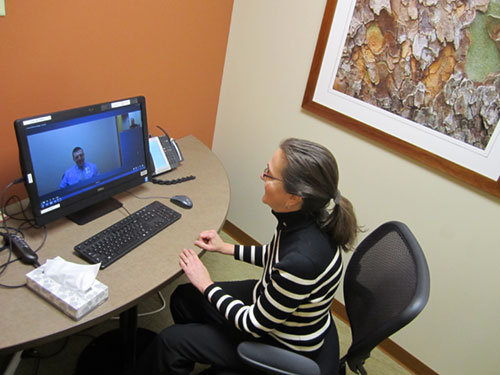When most people think of seeing a psychiatrist or psychologist, they picture talking face-to-face with someone. That is getting harder with a national shortage of psychiatrists. However, more providers of behavioral health—and their patients—are turning to and accepting an alternative: telepsychiatry.
Rogers Behavioral Health is among those finding two-way video can work. And some patients even prefer it.
Telepsychiatry, or telemedicine, allows patients to receive treatment from their psychiatrist through a video conference program, similar to Skype or FaceTime, but with heightened security. Under the supervision of nursing staff, patients use the program at Rogers’ campuses to speak with a psychiatrist, who could be hundreds of miles away.
“Kenosha, Wisconsin, is a community that has a psychiatry shortage that is more significant than the national average,” says Debbie Minsky-Kelly, director of partial hospital operations at Rogers Behavioral Health–Kenosha. Minsky-Kelly and the rest of the Kenosha team have led the way for Rogers in improving access by using telepsychiatry beginning about 18 months ago.
“Before we had telepsychiatry, our patients’ face-to-face therapy time was limited because our psychiatrists had to travel to see patients and sometimes harsh weather conditions made traveling dangerous,” says Minsky-Kelly. “The technology has made our psychiatrists more readily available to provide care, including in emergency situations, which has helped to increase our patient safety.”
At the Kenosha clinic, two physicians are exclusively using telespychiatry to treat patients, but all members of Kenosha’s medical staff are being trained to use the technology. “After our staff quickly became comfortable working with the system, it was easy to see the value of this resource and the full potential it could have,” says Minsky-Kelly. “Without this program and our clinic’s teamwork, we would not have been able to increase our services and recruit some of the best physicians available both on-site and off.”
In addition to the staff, patients and their families have also been highly satisfied with the technology. “We’ve found that many of our patients actually prefer using telepsychiatry over face-to-face psychiatry,” says Susan Johnson, a registered nurse at Rogers–Kenosha. “Sometimes, when patients have never received behavioral health treatment before, the thought of being in a room with a psychiatrist can be a little intimidating. Some patients are more comfortable speaking with their psychiatrist through technology instead of face-to-face interaction, which can be a big leap for many who have trouble working up the courage to seek help.”
Children as young as six years old to patients that are well into adulthood have been using the system. “If a patient is nervous about using telepsychiatry for the first time or is fairly young in age, our nursing staff is happy to hold a practice session for a patient to help familiarize them with the routine,” says Johnson.
Like all technology, there can sometimes be minor glitches or setbacks to the system. “We have experienced the occasional internet connection failure, but we’ve worked hard to prevent those issues and are sharing our knowledge throughout Rogers’ system,” says Minsky-Kelly. “Any minor issues we encounter are similar to the hiccups we face in face-to-face therapy, but the benefits to using telepsychiatry and the increased time patients have with their psychiatrists have far outweighed our little bumps along the way.”
When using a video program, a doctor may not be able to gather the same information about a patient that he or she would normally be able to in a face-to-face session, such as the presence of alcohol on a patient’s breath. “The registered nurses assess patients prior to every telemedicine session and pass along any important health information that the doctor may not have been able to gather from their computer screen,” says Johnson. “The nurses help to pick up where the technology may fall short and together we create a more comprehensive approach.” Strong patient satisfaction scores support expanded use of telemedicine when needed and appropriate, Minsky-Kelly says.
Rogers currently has 13 psychiatrists certified for telemedicine across our system, with plans to add more. Various intensive outpatient and partial hospital programs use telepsychciatry at Rogers’ Wisconsin-based locations. Our regional locations inChicago, Nashville and Tampa Bay also regularly use the technology in their outpatient programs as well.


